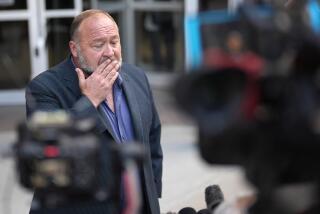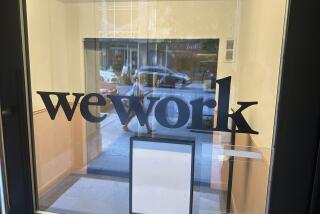Smith Turns to Chapter 11 for Bankruptcy Protection
- Share via
Smith International Inc., one of the world’s largest oil services companies, Friday filed for bankruptcy protection, just three weeks after being ordered to pay its largest competitor more than $200 million to settle a patent infringement lawsuit.
The filing under Chapter 11 of the U.S. Bankruptcy Code gives Smith, which has lost more than $221 million in the last three years, some much-needed breathing room while it sorts out its troubled finances and determines how it will pay the huge lawsuit settlement to Hughes Tool Co.
Perhaps the single largest effect of the Newport Beach-based company’s bankruptcy maneuver is that it will force Hughes to wait months, and possibly years, to receive its settlement payment.
“The net effect is that the filing puts an immediate roadblock in Hughes’ efforts to collect the settlement,” explained David B. Toy, a Los Angeles attorney who represented Hughes during the lawsuit.
William A. Kistler, Hughes Tool’s president and chief executive, said that while he was “very disappointed” at Smith’s filing, his company was “prepared to work under these kinds of conditions.” However, Kistler declined to outline Hughes’ contingency plans.
Some analysts said the move would force Hughes to the bargain
ing table to settle the damage award.
Friday’s filing came less than 24 hours after U.S. District Judge Harry L. Hupp in Los Angeles released a 65-page rough draft of his order spelling out the extent of damages Hughes is entitled to collect because Smith infringed on its patent for a rubber seal used in a drilling bit. Attorneys, who were still calculating the exact damage award late Friday, estimated that the final settlement would be between $202 million and $205 million.
Hupp’s move Thursday afternoon signaled that he was ready to enter a final judgment against Smith. The final ruling would have thrown Smith into default on $260 million in bank loans and hindered its ability to manage its operations because it would have made the settlement to Hughes immediately payable.
Ronald J. Trost, Smith’s bankruptcy attorney from the Los Angeles firm of Sidley & Austin, confirmed that Hupp’s pending ruling prompted the bankruptcy filing. “We couldn’t pay a $200-million judgment today,” he said.
In its filing with the court, Smith said its directors voted on Feb. 24 to file for Chapter 11 after discussions with its 20 largest creditors, many of whom supported the filing. Furthermore, Loren Carroll, chief financial officer, said in a sworn statement, “I received the impression . . . that some of our banks were considering the filing of an involuntary Chapter 11 petition . . . to prevent Hughes and other creditors from obtaining liens.”
Stock Down 87.5 Cents
Trading in Smith stock was halted by officials of the New York Stock Exchange just after noon Eastern time as news of the bankruptcy action was disseminated. The issue had lost just 25 cents a share on light volume before trading was halted. But after trading resumed at about 3 p.m. EST, Smith’s shares fell to $1.875 a share, down 87.5 cents for the day.
In a prepared statement, Smith Chairman and Chief Executive Jerry W. Neely admitted that the company “initiated the bankruptcy proceedings in order to bring its assets and operations under the protection of the bankruptcy court while it reorganizes its financial affairs.”
But while the filing suspends payment of the award and any attempts by Hughes to collect it, Trost said it does not rule out the possibility of an appeal of the award which capped a bitter 14-year battle between the two rivals and is believed to be among the largest in any U.S. patent-infringement case.
The bankruptcy petition, which included some five volumes more than one foot thick, surprised few who had been watching the company. Some analysts had predicted the move since Hupp’s initial ruling Feb. 14. Others welcomed it as a wise maneuver to buy time before it has to settle with Hughes.
“This provides for an orderly settlement of affairs,” said Philip Meyer, an analyst with Eberstadt Fleming Inc. in New York. “This company is not going out of business. It is going to survive.”
Creditors Listed
The company’s bankruptcy petition listed assets as of Dec. 31, 1985, of $671.3 million and liabilities of $483.9 million. Although its assets outweigh its debts, Smith would be forced to liquidate a substantial part of its holdings to pay its huge debt to Hughes.
In addition to Hughes, Smith’s filing listed its 10 largest creditors as First Fidelity Bank of Newark, N.J., $77.4 million; Chase Manhattan Bank in New York, $58.2 million; Security Pacific National Bank in Los Angeles, $27.4 million; Midland Bank of London, $25.5 million; Bank of America, $19.1 million; Morgan Guaranty Trust Co. of New York, $15.1 million; Amsterdam-Rotterdam Bank, $13.6 million; Royal Bank of Scotland, $12.3 million; Aetna Life & Casualty Insurance Co., $10.8 million, and Banque National de Paris, $10.3 million.
The bankruptcy action, which allows Smith to conduct business as usual while it works out a repayment schedule, does not cover its foreign subsidiaries which accounted for about 26% of the company’s total sales of $746 million in 1984, the last year for which sales are available.
In preparation for the filing, Smith closed about 300 of its bank accounts nationwide. The closures forced Smith to pay employees laid off Thursday by cashier’s check drawn on CommerceBank of Costa Mesa.
Creditors’ Committee
A normal part of any bankruptcy reorganization is the formation of a creditors’ committee to help oversee the company’s operations. However, in this case analysts and insiders wonder if Hughes, Smith’s largest creditor, will be included on the committee because the two firms are business competitors. Allowing a Hughes representative on the committee, noted one insider, would give the company access to business secrets and plans that could ultimately ruin Smith.
“We haven’t addressed whether we should be on the committee,” said Hughes attorney Toy. “It certainly would be an unusual committee arrangement if we were.”
Even without its obligation to Hughes, one analyst said plunging oil prices and declining oil drilling has placed Smith in a difficult financial position.
“I don’t think the Hughes suit is the whole story, but it was one of the bigger factors,” said Herbert Hart, an analyst with the San Francisco brokerage house of S.G. Warburg, Rowe & Pitman, Akroyd Inc.
Another major factor in Smith’s fall, analysts have said, was a pattern of frittering away its assets and energies on what turned out to be ill-advised moves and strategies, including on-again, off-again diversification moves and, most importantly, the aborted attempt to acquire Gearhart Industries Inc.
Heavy Criticism
The original goal of the Gearhart deal was to incorporate the company’s high-technology oil-drilling devices into the Smith product line, a strategy generally praised throughout the oil industry. However, analysts have heavily criticized Smith and its chairman for failing to withdraw from the deal when Marvin Gearhart started balking.
One key reason for Gearhart’s stubborn resistance, said Tom Law, a Gearhart board member and the company’s general counsel, was the unresolved Hughes patent suit.
“At that time it was just a question of how much they would have to pay,” Law said. “We were concerned that the damages could run into nine figures, and we had very keen concerns that if Smith were to acquire Gearhart our shareholders would suffer very materially. . . . We could see the handwriting on the wall very clearly, and that was one of the biggest reasons we didn’t want to have Smith take over Gearhart.”
Despite Gearhart’s opposition, Smith launched a costly legal fight that lasted more than a year. Eventually Smith wound up losing $80 million on the acquisition attempt.
That money “would have gone a long way to offset . . . damages from the Hughes litigation,” said James Carroll, a securities analyst with Paine Webber Mitchell Hutchins in New York.
Smith International will probably remain listed on New York Stock Exchange. Story, Business, Page 1.
More to Read
Inside the business of entertainment
The Wide Shot brings you news, analysis and insights on everything from streaming wars to production — and what it all means for the future.
You may occasionally receive promotional content from the Los Angeles Times.










